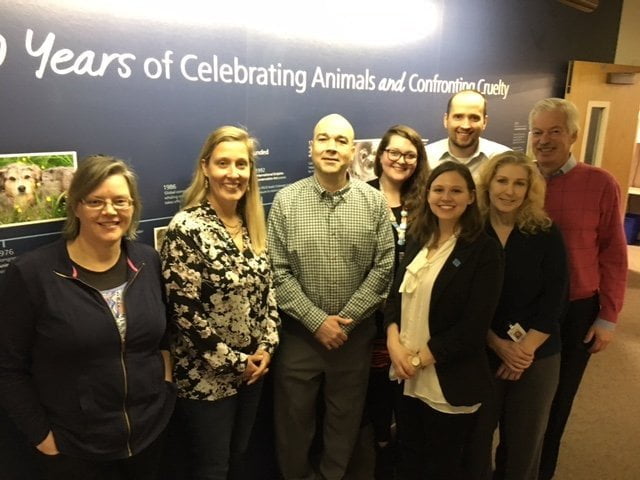Better Than Most is a regular feature of The Business of Giving examining the best places to work among social businesses and nonprofit organizations.
Wayne Pacelle: We’re taking on puppy mills and dog fighting, things that many people have heard about, your listeners have heard about, but also factory farming, seal hunting, commercial whaling, horse slaughter, horse soring, greyhound racing. It’s a wide range of issues, a big set of problems…
 Katie: And so through our pets in the workplace program and through colleagues who had been through the program, my dog now comes with me to work every single day and is happy. He’s content. He has some favorites around the office. We have a dog park out back and anybody can go to it and bring their dog and just kind of romp around, and so that’s just one little perk that helps me and it helps me to refocus.
Katie: And so through our pets in the workplace program and through colleagues who had been through the program, my dog now comes with me to work every single day and is happy. He’s content. He has some favorites around the office. We have a dog park out back and anybody can go to it and bring their dog and just kind of romp around, and so that’s just one little perk that helps me and it helps me to refocus.
Julie: One thing that strikes me about working here is if you are driving to work and you find an injured baby bird on the side of the road or there’s a stray dog down professional drive, all you need to do is send out an all staff email the minute you get here, and there will be an army of people helping out and that’s a really great thing.
Emily: We also have an award-winning recycling program and we also compost—I’m on the compost committee—so we try to make sure we are leaders for the environment as well.
Another thing that we have is a chalkboard. It’s actually that paint that creates a chalkboard so we can write in things that we are grateful for. We feature an employee of the month on that chalkboard; ideas, so it really creates and fosters a culture of collaboration, like I said, and appreciation for one another.
Sara: …they can identify the bird. They can probably talk about what the diet the bird needs. They’ll know what the habitat is. They know where exactly to put it. They need to know if it’s climate controlled or how long it can be released or where should it go. So there’s just really this expertise that’s not tapped into anywhere else, and I get great pride from that. It makes me proud to work here. It makes me feel like I’m part of something bigger or potentially part of that collective. So those are some of the ways that I think the corporate culture influences one of [unintelligible].
Katie: there really is no time clock. We work weekends, we’ll work nights. It’s because we love the job and we love the work that we do. And without those crazy nights or early mornings, driving puppies from [Dallas] to Angels of Assisi, without that the job doesn’t get done. We’re not here because of a paycheck. We’re here because this is our life.
Sara: So my dog is also an HSUS special. He’s from one of our rescues. When I look at him, what it exemplifies to me is the 100% commitment. That’s what I always say about the culture, is that it’s 100% commitment. If we’re going to intervene in something, it’s all the way, it’s every resource we have, it’s going to be applied.
Jill: It can be very lonely sometimes, you’re basically the only HSUS employee in the state, but it’s also there’s a lot of pressure because you are the face of the HSUS in your state. But I think that everyone in Gaithersburg and the D.C. office does a wonderful job in making sure that state directors feel included and an integral part of the organization, and do everything they can to help them achieve their mission and help them to feel not quite so lonely and isolated out there in their states.

John: A few years ago, actually, where there was a cockfighting ring raid and these animals needed to be held until the case came up where it was going to be resolved.
But throughout that time, again, it was rewarding to actually go in there and feed these animals and clean out their cages, basically things like that given that what they had gone through, you felt connected obviously to them, and each one of them had different personalities.
Chris: We recognize that all animal suffer and all animal feel pain, and that they all deserve our time and attention, and I’m so grateful for that because everyone is on board with it. No one ever gives you a sideways glance when I tell them I work for chickens and pigs. Everyone is supportive and knows that the work we’re doing across the board is crucial.
Sara: I tell you what Wayne provides is tenacity. So he leads by example. I think he sets pretty clear expectations. But he’s tenacious in his fight, and so in the fight for what he believes that HSUS does and so I think in that respect, as a leader, he provides great vision and a good foundation for everybody who’s here.

The Business of Giving can be heard every Sunday evening between 6:00 p.m. and 7:00 p.m. Eastern on AM 970 The Answer in New York and on iHeartRadio. You can follow us @bizofgive on Twitter, @bizofgive on Instagram and at www.facebook.com/BusinessOfGiving/.

